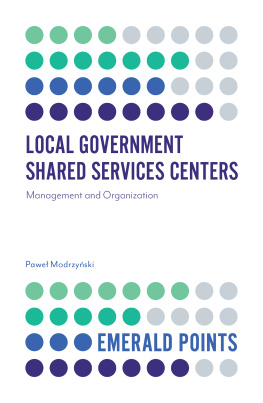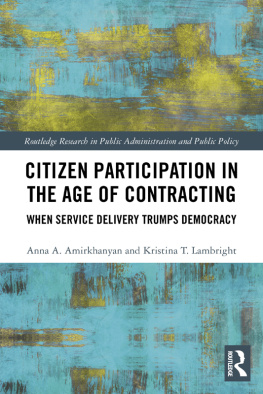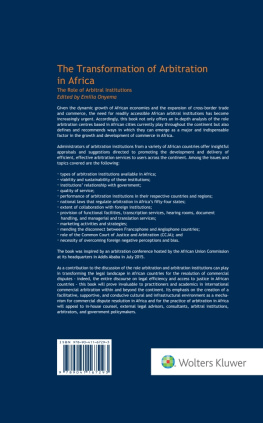FREE TITUS GEBEL
PRIVATE CITIES
MAKING GOVERNMENTS
COMPETE FOR YOU
Copyright 2018 by Titus Gebel
All rights reserved. Reproduction only with prior written authorization.
Originally published in April 2018 by Aquila Urbis, Walldorf, Germany as Freie Privatstdte Mehr Wettbewerb im wichtigsten Markt der Welt.
ISBN-13:978-1724391384 (print)
ISBN-10:1724391380 (print)
Theres many, many exciting and important things you could do that you just cant do, because theyre not allowed by regulation. And that makes sense, we dont want our world to change too fast. But maybe we should set aside some small part of the world where we can try out some new things and figure out: What is the effect on society? And people who like those kinds of things can go there and experience that.
Larry Page,
Co-Founder of Google
History, which is one long record of the imbecilities and the injustices of governments, furnishes us good grounds for seeking some alternative solution for them.
Ralph Borsodi,
Social Theorist
Go where you are treated best.
Christoph Heuermann,
Perpetual World Traveler
Table of Contents
CHAPTER 1:
CHAPTER 2:
CHAPTER 3:
CHAPTER 4:
CHAPTER 5:
CHAPTER 6:
CHAPTER 7:
CHAPTER 8:
CHAPTER 9:
CHAPTER 10:
CHAPTER 11:
CHAPTER 12:
CHAPTER 13:
CHAPTER 14:
CHAPTER 15:
CHAPTER 16:
CHAPTER 17:
CHAPTER 18:
CHAPTER 19:
CHAPTER 20:
CHAPTER 21:
CHAPTER 22:
CHAPTER 23:
CHAPTER 24:
CHAPTER 25:
CHAPTER 26:
CHAPTER 27:
FOREWORD
Dear Readers,
I have written this book for those who want to achieve liberty and self-determination during their lifetimes, but who have recognized that any transformation of existing systems from the inside is difficult to impossible. In my opinion, Free Private Cities or corresponding Special Zones are the only realistic alternative.
I would like to create nothing less than a new market, the market of living together. I already work there, but if I fail, you can continue my work on the basis of this book and make adaptions to the concept where necessary.
The idea is born now and will not disappear again. Since others have developed similar concepts, the time seems to be right.
You would also be welcome as a competitor. Competition stimulates business and it is mankind's only known means of limiting power. If we want to live in freedom and self-determination, then we need more diverse systems, not fewer.
The book is also aimed at all those who want to reform existing societies and may ask themselves what exactly goes wrong and why. I present some answers that you may not have heard elsewhere.
It is always difficult to assess the situation in other countries where you do not live yourself. Therefore, I ask my English-speaking readers to forgive me for the fact that most of the examples come from my former home country, Germany. However, the interested reader will have no difficulty in finding similar examples elsewhere.
Finally, the book is aimed at politicians who have recognized that reforms towards greater freedom and self-determination increase the standard of living in their country, but who are aware that widespread changes in this direction cannot (yet) be communicated to the electorate. The establishment of Free Private Cities or Special Zones can be a solution to that problem by setting an example for what is possible.
The first part of this book deals with fundamental questions that every social order has to face. The concept of Free Private Cities described in the second part is derived from this; historical and current models are examined. The third part deals with concrete questions of implementation of Free Private Cities. Finally, the fourth part provides an outlook on future developments.
Wittgenstein has stated: "Everything that can be said can be said clearly". I have therefore refrained from avoidable jargon, gender differentiation and long, nested sentences.
Special thanks to Dr. Mark Hatlie for reviewing and where necessary improving my English wording.
Monaco, in June 2018
Dr. Titus Gebel
PART I.
LAYING THE GROUNDWORK
CHAPTER 1
LIVING TOGETHER AS A MARKET
It is dangerous to awaken the lion, the tiger's tooth is perishable, but the most terrible of all the horrors, that is man in his delusion.
Friedrich Schiller,
Poet and Thinker
This book is about why we need alternatives in the most important area of our lives and what those alternatives might look like. That area is living together with others. Our worst enemies have long since ceased to be natural disasters or predators. Other people have become the main threat. The crucial question is therefore, how we shape the community with our fellow human beings. Humans are capable of agreeing on certain worldviews and even sacrifice their lives for them. If those ideas are dubious or dangerous, everyone else is in danger. The only real problem with mankind is that people seek to impose their will on others. The task is therefore to create an order which prevents this from happening.
The prevailing view in the West assumes that a combination of democracy and the rule of law is sufficient to combat the abuse of power and facilitate prosperous coexistence. After the collapse of the communist Eastern Bloc some were even proclaiming the end of history. were seen as the endpoint of development, further progress no longer being possible. Soon, all countries around the world would adopt this system. This is a mistake, however, partly because of the fact that all our liberal-democratic constitutions violate their own civil laws in that they are contracts to the detriment of third parties. We will come back to this idea later.
Our coexistence is also a market arrangement, because it is subject to the same forces, whether we like it or not. A market is always present whenever and wherever people come together who are not yet completely satisfied. Every market is characterized by bringing together the supply and demand for goods, services and rights. Even if the majority of voters prefer an anti-market economic system and politicians implement such a system, this is a market result.
States also exist because there is a demand for them. A state order creates a framework within which people can interact socially and exchange goods peacefully. The existence of security and fixed rules makes it possible for large numbers of people to live together. Such coexistence is so attractive that people are willing to accept considerable restrictions on their personal freedom to enjoy it. Even the subjects of the most violent dictator will likely choose the status quo over the life of Robinson Crusoe on a lonely island. Man is a herd animal.
The market of living together is not only the most important, but also the largest market. State activity accounts for approximately 30% of the gross domestic product of all countries.
Any reasonably skilled entrepreneur should be able to do better.
If one could somehow offer the services of the state and at the same time avoid its pitfalls - more and more taxation and paternalism while constantly changing the rules of the game - then a better product will have been created. If the product is successful, more people will want something similar. New concepts will be necessary to get there, of course. If every new approach is rejected at the outset as a utopian pipe-dream, stagnation is likely to result.










